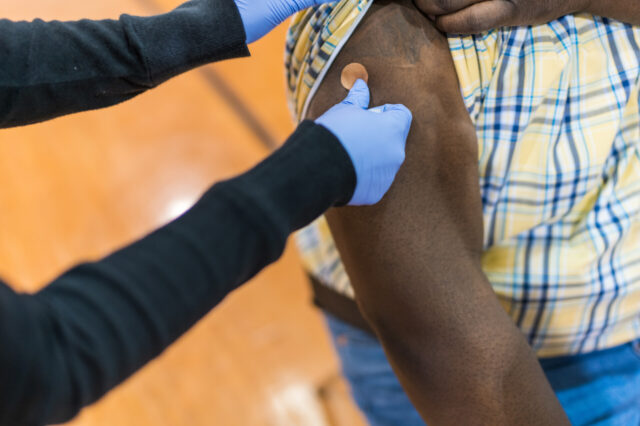Definition
Diphtheria is an acute infection caused by the bacterium Corynebacterium diphtheriae.
Alternative Names
Respiratory diphtheria; Pharyngeal diphtheria; Diphtheric cardiomyopathy; Diphtheric polyneuropathy
Causes
The bacteria that cause diphtheria spread through respiratory droplets (such as from a cough or sneeze) of an infected person or someone who carries the bacteria but has no symptoms.
The bacteria most commonly infect your nose and throat. The throat infection causes a gray to black, tough, fiber-like covering, which can block your airways. In some cases, diphtheria infects your skin first and causes skin lesions.
Once you are infected, the bacteria make dangerous substances called toxins. The toxins spread through your bloodstream to other organs, such as the heart and brain, and cause damage.
Because of widespread vaccination (immunization) of children, diphtheria is now rare in many parts of the world.
Risk factors for diphtheria include crowded environments, poor hygiene, and lack of immunization.
Symptoms
Symptoms usually occur 1 to 7 days after the bacteria enter your body:
-
Fever and chills
- Sore throat, hoarseness
- Painful swallowing
- Croup-like (barking) cough
-
Drooling (suggests airway blockage is about to occur)
- Bluish coloration of the skin
- Bloody, watery drainage from nose
- Breathing problems, including difficulty breathing, fast breathing, high-pitched breathing sound (stridor)
- Skin sores (usually seen in tropical areas)
Sometimes there are no symptoms.
Exams and Tests
The health care provider will perform a physical exam and look inside your mouth. This may reveal a gray to black covering (pseudomembrane) in the throat, enlarged lymph glands, and swelling of the neck or vocal cords.
Tests used may include:
- Gram stain or throat culture to identify the diphtheria bacteria
- Toxin assay (to detect the presence of the toxin made by the bacteria)
- Electrocardiogram (ECG)
Treatment
If the provider thinks you have diphtheria, treatment will likely be started right away, even before test results come back.
Diphtheria antitoxin is given as a shot into a muscle or through an IV (intravenous line). The infection is then treated with antibiotics, such as penicillin and erythromycin.
You may need to stay in the hospital while getting the antitoxin. Other treatments may include:
- Fluids by IV
- Oxygen
- Bed rest
- Heart monitoring
- Insertion of a breathing tube
- Correction of airway blockages
People without symptoms who carry diphtheria should be treated with antibiotics.
Outlook (Prognosis)
Diphtheria may be mild or severe. Some people do not have symptoms. In others, the disease can slowly get worse. Recovery from the illness is slow.
People may die, especially when the disease affects the heart.
Possible Complications
The most common complication is inflammation of the heart muscle (myocarditis). The nervous system is also frequently and severely affected, which may result in temporary paralysis.
The diphtheria toxin can also damage the kidneys.
There can also be an allergic response to the antitoxin.
When to Contact a Medical Professional
Contact your provider right away if you have come in contact with a person who has diphtheria.
Diphtheria is a rare disease. It is also a reportable disease, and any cases are often publicized in the media. This helps you to know if diphtheria is present in your area.
Prevention
Routine childhood immunizations and adult boosters prevent the disease.
Anyone who has come into contact with an infected person should get an immunization or booster shot against diphtheria, if they have not already received it. Protection from the vaccine lasts only 10 years. So it is important for adults to get a booster vaccine every 10 years. The booster is called tetanus-diphtheria (Td). (The shot also has vaccine medicine for an infection called tetanus.)
If you have been in close contact with a person who has diphtheria, contact your provider right away. Ask whether you need antibiotics to prevent getting diphtheria.
References
Centers for Disease Control and Prevention website. Diphtheria. www.cdc.gov/diphtheria/about/index.html. Updated May 26, 2020. Accessed March 8, 2022.
Saleeb PG. Corynebacterium diphtheriae (diphtheria). In: Bennett JE, Dolin R, Blaser MJ, eds. Mandell, Douglas, and Bennett's Principles and Practice of Infectious Diseases. 9th ed. Philadelphia, PA: Elsevier; 2020:chap 204.
Stechenberg BW. Diphtheria. In: Cherry JD, Harrison GJ, Kaplan SL, Steinbach WJ, Hotez PJ, eds. Feigin and Cherry's Textbook of Pediatric Infectious Diseases. 8th ed. Philadelphia, PA: Elsevier; 2019:chap 90.


